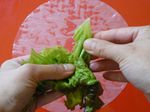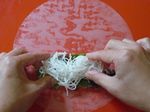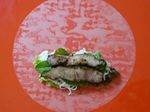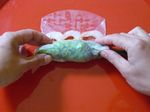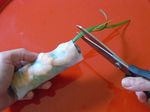Day: September 25, 2013
[recipe] Vietnamese summer rolls

(Makes 8)
150g cooked, shredded ginger pork (or chicken)
16 large raw, peeled prawns
1 block of rice vermicelli
4 sprigs of coriander
2 chives, cut into 10cm lengths
1 carrot, peeled and grated
1/4 cucumber, cut into thin matchsticks
1/2 red pepper, cut into thin slices
1 soft lettuce, ½ shredded (or rocket)
8 rice paper wrappers
For the dipping sauce:
1 tbsp sugar
2 tbsp lime juice
1 tbsp soy sauce
1 bird’s eye chilli, finely sliced
Bring a small pan of water with 1 tbsp salt added, to the boil. Add the prawns, turn down the heat and poach for two minutes until pink. Drain and cut in half.
Put the noodles in a large bowl and pour over boiling water. Add ½ tsp salt, leave for about four minutes until al dente, then rinse well in cold water and drain thoroughly.
Set out all the ingredients within easy reach of a clean, dry chopping board. Half fill a bowl big enough to fit the wrappers in with cold water, and then dunk one in and keep patting until it’s pliable, but not completely soft. Lay flat on the chopping board.
Arrange two crossed chives, if using, horizontally towards the bottom edge of the wrapper. Top with four prawn halves in a horizontal line, and top these with a line of herb leaves. Add a pinch of carrot and a few cucumber and red pepper sticks, some of the sliced pork, then a small clump of rice vermicelli. Finish with some shredded lettuce.
Bring the bottom edge of the wrapper tightly up over the filling, and then fold the sides in over it. Continue to roll up tightly and place on a plate, join-side down. Cover rolls with lettuce leaves to keep them fresh.
Once all the rolls are made, make the sauce. Whisk the sugar into the lime juice to dissolve, then add the remaining ingredients. Adjust to taste if necessary.
[recipe] Chocolate espresso mug cake

Ingredients
3 tbsp all purpose flour
1 tsp instant coffee powder
2 tbsp drinking chocolate powder or sweetened cocoa powder
2.5 tbsp sugar
1/4 tsp baking powder
2 tbsp milk
1 egg
2 tbsp oil
1/2 tsp vanilla extract
Method
In a mixing bowl combine all purpose flour, coffee powder, sugar and baking powder. Mix well.
Add milk, egg, oil and vanilla extract. Stir with a fork just until combined.
Pour into a greased mug and microwave on high for 90 seconds (or a few seconds more) until cooked through.(DO NOT OVER COOK)
Serve with a scoop of vanilla ice cream or simply dust with powdered sugar.
ENJOY!!!!!
NOTE: you can use cocoa powder instead of drinking chocolate mix. In that case, add 1 or 2 tsp more sugar according to your taste.
The Mozilla Foundation wants to debug scientific code
When ecologist Carl Boettiger wrote a blog post in June calling for greater stringency in the peer review of scientific software in research papers, he hardly expected to stir up controversy. But in 54 comments on the post, researchers have debated how detailed such reviews should be; one said that it was a “trifle arrogant” of Boettiger, of the University of California at Santa Cruz, to insist that computer code attain his stringent standards before publication.
Now an offshoot of the Internet non-profit organization Mozilla has entered the debate, aiming to discover whether a review process could improve the quality of researcher-built software that is used in myriad fields today, ranging from ecology and biology to social science. In an experiment being run by the Mozilla Science Lab, software engineers have reviewed selected pieces of code from published papers in computational biology. “Scientific code does not have that comprehensive, off-the-shelf nature that we want to be associated with the way science is published and presented, and this is our attempt to poke at that issue,” says Mozilla Science Lab director Kaitlin Thaney.
Researchers increasingly rely on computation to perform tasks at every level of science, but most do not receive formal training in coding best practice. That has led to high-profile problems. Some scientists have argued, for example, that the fraudulent findings used as the basis for clinical trials in 2007 would have been exposed much earlier if cancer researcher Anil Potti of Duke University in Durham, North Carolina, had been compelled to publish his data and computer code along with his original papers.
More routinely, incorrect or slipshod code prevents other researchers from replicating work, and can even lead them astray. In 2006, Geoffrey Chang of the Scripps Research Institute in La Jolla, California, had to retract five research papers on crystal structure after finding a simple error in the code he was using, which had been provided by another lab. “That’s the kind of thing that should freak any scientist out,” says computational biologist Titus Brown at Michigan State University in East Lansing. “We don’t have good processes in place to detect that kind of thing in software.”
Mozilla is testing one potential process, deploying the type of code review that is routinely used on commercial software before it is released. Thaney says that the procedure is much like scientific peer review: “The reader looks for everything, from the equivalent of grammar and spelling to the correctness of the logic.” In this case, Mozilla opted to examine nine papers from PLoS Computational Biology that were selected by the journal’s editors in August. The reviewers looked at snippets of code up to 200 lines long that were included in the papers and written in widely used programming languages, such as R, Python and Perl.
The Mozilla engineers have discussed their findings with the papers’ authors, who can now choose what, if anything, to do with the markups — including whether to permit disclosure of the results. Those findings will not affect the status of their publications, says Marian Petre, a computer scientist at the Open University in Milton Keynes, UK, who will debrief the reviewers and authors. Thaney expects to release a preliminary report on the project within the next few weeks.
Computational biologists are betting that the engineers will have found much to criticize in the scientific programming, but will also have learnt from the project. They may have been forced to brush up on their biology, lest they misunderstood the scientific objective of the code they were examining, Brown says. Theo Bloom, editorial director for biology at non-profit publisher PLoS, shares that expectation, but says such reviews may still be useful, even if the Mozilla reviewers lack biological expertise. Yet that would prompt another question: how can journals conduct this type of review in a sustainable way?
The time and skill involved may justify paying reviewers, just as statistical reviewers of large clinical trials are paid. But researchers say that having software reviewers looking over their shoulder might backfire. “One worry I have is that, with reviews like this, scientists will be even more discouraged from publishing their code,” says biostatistician Roger Peng at the Johns Hopkins Bloomberg School of Public Health in Baltimore, Maryland. “We need to get more code out there, not improve how it looks.”


